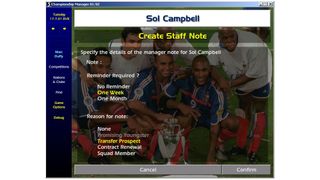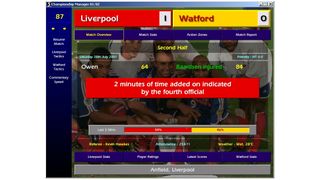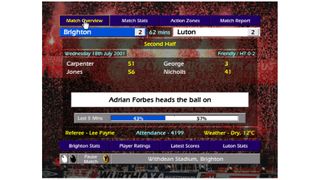Why people are still playing Championship Manager: Season 01/02 two decades later
Extra time

Maxim Tsigalko. Two words that instantly grant entry into a low-profile but sizable club, a community as passionate as any in gaming. Intone the name of this Belarussian striker in the right company, and you’ll make immediate friends. Wry smiles will be exchanged. They’ll know you’re a fellow Championship Manager 01/02 fan.
The real Maksim Tsyshalka passed away in 2020, at just 37. Back in 2018, he gave an interview with Gazzetta.gr in which he detailed a footballing career cut tragically short by injury, and subsequent difficulties earning a living at all. With hindsight’s 20-20 vision, it’s a harrowing read.
If any consolation can be found in Tsyshalka’s passing, it’s the fact that it was marked and mourned by a global community. Virtual football managers in their legion for whom Tsyshalka, known in the game as Tsigalko due to the vagaries of translating the Russian alphabet and Belarussian pronunciation to the Roman alphabet, is an icon.
Parallel universe

In Championship Manager 01/02’s parallel universe, there was no Leo Messi. There was Maxim Tsigalko instead. Playing for Dinamo Minsk aged 19 at the game’s start, he’d inevitably become the most prolific forward in world football. Talk to any CM01/02 player and they’ll have an anecdote about him: 50+ goals a season, seven years in a row, for Aberdeen; denying the likes of Henry, Vieri, and Ronaldo the Ballon d’Or and taking it for his own; winning the Champions League with four different clubs. Mighty Maxim could, would, and did it all.
That would be scant solace for Tsyshalka himself, who only realised his international fame years after CM01/02’s release and lamented the fact that somewhere out there in the world people were making money selling t-shirts with his face on it, the word ‘Legend’ printed underneath. But now he’s gone, and at such a tragically young age, CM01/02 seems to take on new meaning. Or perhaps it’s a meaning that was always there, central to its appeal to many of us in its community – an alternate universe where it’s always 2001 and potential always has the chance to be fulfilled. Rest in peace, Maksim.
There have been 18 Football Manager games in the intervening years, six Championship Manager games before this one, and eight more after it. There’s no match engine, the database is twenty years out of date, and next to modern Football Manager it’s incredibly simplistic. And yet it just won’t go away.
Strong as ever

Right now, as I write this article at 11pm on a Saturday evening, there are 133 users online on champman0102.net. Modders have built entirely new databases including modern-day updates, vintage eras like the excellent 93/94 database, and even a database that adds prominent players from post-2001 to the original game, as the age they were at the time. If you play enough, you’ll start to see Messi, Ronaldo, Neymar et al start to emerge as superstars. The reality is watching an 8-year-old Mauro Icardi score on his Serie A debut for Venezia. It’s a wonderland of sports archivism, and its Twitter following is almost 10k strong.
Get daily insight, inspiration and deals in your inbox
Sign up for breaking news, reviews, opinion, top tech deals, and more.
Modern Football Manager has become such an unwieldy, bloated, joyless activity by contrast to classic Championship Manager
Which, of course, raises the question: why this one? FM2022 has a detailed match engine, real sports data readouts and analysis, an incredible database of players that real scouts now use as a recruitment tool, and simulates every aspect of a manager’s job from press interviews to negotiating with agents, handling boardroom meetings and trying to resolve locker room riffs between Matty Longstaff and Bruno Guimarães. It's light years ahead of CM01/02.
And that’s exactly the point. Modern Football Manager has become such an unwieldy, bloated, joyless activity by contrast to classic Championship Manager. Playing through one full season might take several weeks of dedicated play now – back in 01/02 it was one determined afternoon’s work.
Yes, there are infinitely more features and things to fiddle with, but almost none of them are fun. And hand on heart, I don’t miss any of them when I play CM01/02. This was the exact point when the series hit its sweet spot: the perfect balance between depth and playability.

That’s not to say you can’t have a good old fiddle with the tactics. Even to this day, the topic of WIBWOB formations is searingly controversial. By exploiting the ability to set individual player positions on and off the ball according to where ball is on the pitch, it’s possible to create unbeatable tactics. You just load them into your game, field practically any team, and watch them bang in seven a game like latter-day Man City. Put Maxim Tsigalko at the head of that team and they don’t even bother organizing the Champions League knockout matches – they just hand the trophy directly to you. Is it cheating? By nearly everyone’s estimation, yes, It is. But is it fun? Put it this way: ask present-day Erling Haaland whether he’s bored netting one to two goals every match.
CM01/02 purists prefer to build tactics that don’t exploit WIBWOB (with ball/without ball) glitches in the match engine. They’ve been tinkering on those formations for decades like wizened virtual Wengers, striving for ever more shots on target, fewer corners conceded, and the holy grail: a better goal difference than Roma at the end of the season. There’s enough tactical depth, then.
But CM01/02’s most potent hit has yet to be mentioned: the sheer, endorphin-releasing, everything’s-going-to-be-alright-forever bloody footballing nostalgia of it. If you hadn’t picked up that footballing nostalgia was an effective consumer draw by observing that all the current Prem teams’ kits for the last five years look like their 95/96 shirts whizzed through Adobe Illustrator, take it from someone who paid north of £300 for a USA ‘94 Italy shirt with BAGGIO 10 on the back: it is.
Oldie but a goodie

Wearing a fusty old shirt with an itchy collar in the name of ‘90s remembrance is one thing. Loading up a videogame that has meticulously charted one precise moment in footballing time, down to every transfer fee (£25m for Salas, what were Juve thinking?), every false passport ban (Alvaro Recoba), and every torn cruciate (rest up Alan Shearer, you’ll get game time in 02/03) is quite another. If you cared about football then and now, it’s a genuinely intoxicating thrill to immerse yourself back in CM01/02 and lose hours doing absolutely nothing in it. Looking at how many seasons Stefan Reuter’s been at Dortmund; sorting all known players in the world by average rating; marveling at all the incredible Roma players you’d forgotten about. It’s a warm comfort blanket of numbers, a world that feels large and complete enough to retreat into when the real one’s not that attractive – CM01/02 got me through 2021’s five-month lockdown while living and working alone in a remote part of Somerset. That says something about how fascinating its numbers are.
An interactive memorial to players who are now sadly no longer with us, and a moment frozen in time for football fans
Developer Sports Interactive knows about us. One could argue that its ‘Touch’ releases are a tacit agreement that modern Football Manager has become too fiddly, too silted up with feature-bloat to truly enjoy like we used to enjoy a Championship Manager save. But there’s no going back for the series now – and nor should there be. CM01/02’s modders manage to build a database of modern players every time a new season rolls in, so frankly we don’t need Sports Interactive.
It’s an incredibly significant release, then. An interactive memorial to players who are now sadly no longer with us, and a moment frozen in time for football fans with a particular attachment to the early noughties era. The slickest Championship Manager or Football Manager has ever been, a modding platform with new creations two decades on, and a small moment of comfort to those of us struggling to accommodate the reality that time keeps accelerating as we age, and potentially keeps diminishing – thanks to CM01/02 there is forever one corner of the virtual world where it’s always July 2001, and Taribo West is available on a free.

Ad creative by day, wandering mystic of 90s gaming folklore by moonlight, freelance contributor Phil started writing about games during the late Byzantine Empire era. Since then he’s picked up bylines for The Guardian, Rolling Stone, IGN, USA Today, Eurogamer, PC Gamer, VG247, Edge, Gazetta Dello Sport, Computerbild, Rock Paper Shotgun, Official PlayStation Magazine, Official Xbox Magaine, CVG, Games Master, TrustedReviews, Green Man Gaming, and a few others but he doesn’t want to bore you with too many. Won a GMA once.